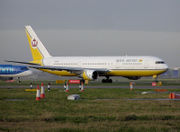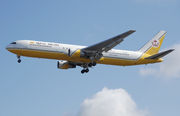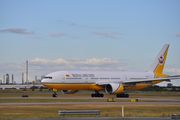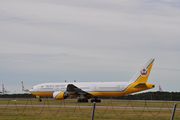Royal Brunei Airlines
|
||||
| Founded | 1974 | |||
|---|---|---|---|---|
| Hubs | Brunei International Airport | |||
| Frequent-flyer program | Royal Skies | |||
| Member lounge | Sky Lounge | |||
| Fleet size | 14 | |||
| Destinations | 18 | |||
| Parent company | Government of Brunei | |||
| Headquarters | Bandar Seri Begawan, Brunei | |||
| Key people | Robert Yang (CEO) | |||
| Website | www.bruneiair.com | |||

Royal Brunei Airlines Sdn Bhd (Malay: Penerbangan DiRaja Brunei, Jawi: ﻓﻧﺭﺑﺎڠن ﺩﻴﺮﺍﺝ ﺑﺮﻮﻧﻲ), or RBA, is the flag carrier airline of the Sultanate of Brunei. It is wholly owned by the Government of Brunei. Its home base is the Brunei International Airport in Berakas, just to the north of the capital of Brunei, Bandar Seri Begawan.
Contents |
History
Pre-independence
Royal Brunei Airlines was established on 18 November 1974 with two Boeing 737s.The airline's first flight was on 14 April 1975 from the new Brunei International Airport to Singapore. Flights to the then British colony of Hong Kong and the city of Kota Kinabalu and Kuching in East Malaysia (Malaysian Borneo) started the same day. Early route expansion included services to Manila in 1976, and Bangkok in 1977.
Royal Brunei acquired a third Boeing 737 in 1980, allowing the airline to reach Kuala Lumpur in 1981 and Darwin in 1983.
From national independence
After the independence of Brunei from the United Kingdom on 1 January 1984, services commenced to Jakarta on 3 January, thus linking all five ASEAN capital cities to Brunei.
Three Boeing 757 aircraft were purchased in the mid 1980s to enable the airline to expand to Taipei in 1986, and Dubai, in 1988. In 1990, Royal Brunei began their first flight to Europe when services started to Frankfurt am Main via Bangkok and Dubai. Services to London Gatwick Airport commenced in 1990 via Singapore and Dubai, and changed to London Heathrow Airport in 1991. Also in 1991 routes opened to Perth and to Jeddah via Dubai.
Rapid expansion
With the airline's rapid expansion the 737s were sold and Boeing 767 aircraft bought. The delivery of the first Boeing 767 broke a world record when it flew 17 hours and 54 minutes non stop from the Boeing company in Seattle to Jomo Kenyatta International Airport in Nairobi on its way to Brunei. Seven more 767s were delivered, taking the fleet to eight 767s and two Boeing 757s (One of the 757s was sold off to fund the purchase of the new 767s).
In March 1993, Abu Dhabi was added to the route network and flights to Frankfurt and Jeddah were routed through Abu Dhabi instead of Dubai. Bali was the second Indonesian city to be added to the network in May of the same year. Flights to the third destination in Europe, Zürich, commenced in August 1993 via Kuala Lumpur and another new destination, Bahrain. Before the end of the year, services to Beijing, (October), and Cairo (November), via Kuala Lumpur and Bahrain, were inaugurated. Royal Brunei sold its last Boeing 737-200 to Aloha Airlines in 1993.
The growth of the network continued in 1994. The delivery of two Fokker 50 aircraft were used to start services to Miri and Labuan in East Malaysia of the same year. Flights to Brisbane and Osaka commenced the same year in June and December respectively (the Brisbane service was initially routed via Darwin but later upgraded to a nonstop flight). The desire to link all the major Oil and Gas cities on Borneo saw the addition of Balikpapan to the route network in December.

In 1995, services began to Kolkata, via Singapore and then on towards Dubai. Two Dornier 228s were purchased in the same year and leased to the Malaysian regional carrier, Hornbill Airways, to connect Brunei by air to Mulu Airport. The service to Cairo was suspended in the middle 1995 due to low passenger numbers.
The F-50s were replaced by the larger and more comfortable F-100 jets in 1996 which fueled expansion to Bintulu. The route to Zürich was suspended in September 1996 to enable Royal Brunei to commence daily services to London Heathrow. Some London flights were routed through Yangon and Abu Dhabi, instead of via Singapore and Dubai; however, Yangon proved uneconomical and was discontinued the following year.
Consolidation
In August 1997, a Dornier 228 owned by Royal Brunei Airlines but operated and maintained by Malaysian regional carrier Hornbill Airways, carrying 19 passengers to Miri, crashed into high ground near Miri airport. All 19 passengers and two crew died. The Dornier 228s were sold in 1997 and short haul services connecting Brunei to Miri, Labuan, Mulu and Bintulu were terminated. Surabaya was the fourth Indonesian destination to be added to the network later that year.
Unprofitable routes to Beijing and Osaka were suspended in 1998 and the F-100s were also sold off to Alpi Eagles Airlines in 1998.
Kuwait was added to the network in 2000 and was served via Singapore, Kolkata and Dubai. It was suspended a year later. Services also began to Shanghai Pudong International Airport in 2001. Royal Brunei started online booking facilities the same year.
Restructuring
After years of unprofitable operation, Royal Brunei began major restructuring in year 2003. The plan was for Royal Brunei’s fleet to grow from 9 aircraft in 2003 to 24 aircraft by the year 2013. The fleet of 6 Boeing 767 will be changed to 15 new narrow-bodied aircraft and 8 wide-bodied aircraft. The plan calls for half of the new aircraft to be leased and the others to be purchased. The plan also included new services to Auckland, Tokyo, Ho Chi Minh City, Sydney and Seoul and to increase its frequencies on other flights.
For 2004 to 2010, Royal Brunei will invest US$400 million to buy wide-bodied aircraft. For the year 2008 to 2013, Royal Brunei will invest US$200 million to buy narrow-bodied aircraft to replace the current fleet of B767-300 aircraft and also further increase the number of narrow-bodied aircraft.
In 2003, the deliveries of the new Airbus A319 and A320 marked the start of the re-equipping exercise. Two A319s were delivered on 28 August and 3 September. A320s were added 9 December and 3 January 2005. All of the Airbus were leased from CIT Aerospace of USA in a seven year contract. The Airbuses fly mainly on regional routes. With the introduction of new aircraft, the Boeing 757 has been phased out and sold to other parties.
In May 2003, Royal Skies, the airline's frequent flyer programme, was launched.
On 31 October 2003, a Royal Brunei jet touched down at Auckland Airport making it the first destination in New Zealand and the first new destination added to the network as part of the restructuring exercise.
By end of the year 2003, Royal Brunei entered a controversial agreement with Royal Tongan Airlines of Tonga. Under the agreement, Royal Tongan wet-leased one of the two remaining B757s. In return, Royal Brunei was given the opportunity to open up US markets via Tonga. However, before US routes could be planned Royal Tongan went into bankruptcy with huge debts in mid 2004, after less than 6 months of operation. As Royal Tongan was unable to pay the lease fees, the B757 was repossessed and stored at Auckland International Airport.
In January 2004, the airline launched Blue Sky Fares, a low cost Internet booking facility, offering cheaper economy class fares to selected destinations, to compete with low cost carriers in the region, such as AirAsia.
Starting in March 2004, four of Royal Brunei’s Boeing 767 aircraft were modified by the introduction of SkyDreamer seats in Business Class to replace the old First Class and Business Class Skyluxe seats. Business Class was renamed as Sky Executive Class and in Economy class each seat was installed with an 8.4 inch TV. Sky Executive Class was subsequently renamed Business Class following poor response from the public.
The unprofitable Taipei route was suspended in late 2004. Kuching and Kolkata were dropped on 31 Oct 2004 due to the rising oil prices, but at the same time, Sydney was added to the route network. Commencing 17 December, flights to Jeddah were routed through Sharjah instead of Abu Dhabi.[1]
2006 and beyond

Royal Brunei added Ho Chi Minh City to its network list in May 2006, flying there 3 times every week. In July 2007, RBA appointed a new CEO, Ray Sayer, who left the role after just 20 months in the post.
In early September 2007, RBA suspended flights to Frankfurt am Main as part of its latest restructuring exercise.[2] Kuching was reintroduced to the network on 1 December 2007, after a break of 3 years.[3]
Royal Brunei Airlines then suspended services to Darwin on 26 January 2008, after serving the route for 24 years.[4] Sharjah was also dropped from the network early 2008 when Jeddah flights were routed nonstop from Bandar Seri Begawan. However, Shanghai was "suspended" in April 2008,[5] and Sydney and Bali were dropped from the summer schedule of 2008.[6]
On 2 June 2008, Royal Brunei Airlines increased services to Auckland from Bandar Seri Begawan by offering a new direct service three times a week. This direct service is in addition to increase in frequency of the existing route via Brisbane from three to four times a week.[7]
Mr Robert Yang was appointed as Chief Executive Officer effective from 1 July 2009.
From 28 March 2010 the service to Shanghai was reintroduced with a frequency of 4 times per week. Auckland was delinked from Brisbane making Auckland 5 times per week and Brisbane 6 times per week.
From 17 June 2010, Royal Brunei Airlines introduced ex-Singapore Airlines Boeing 777-200ER aircraft to replace the Boeing 767 fleet that is being returned to their lessors.[8]
Destinations
Royal Brunei has started services to three of the five destinations (Auckland, Sydney and Ho Chi Minh City) stated in the 2003 restructuring plan. Sydney was added to the network in 2004, but was "suspended" (at the same time as Bali) in 2008.[6] Royal Brunei plans to expand to Melbourne in 2010.
The airlines has a codeshare agreements with the following airlines:
New UK-Brunei air services agreement
Brunei Darussalam and the United Kingdom enhanced their air transport cooperation by agreeing to allow more air services between the countries on 23 November 2007. The agreement comes into action with immediate effect. The agreement offers new opportunities for both countries to foster cooperation in air transport bringing valuable inbound tourism industry and commerce between the two countries. The United Kingdom is considered an important gateway for European tourists coming to Brunei. Royal Brunei Airlines operates daily flights between Brunei and London via Dubai. According to Brunei Tourism, the latest tourism figures of holiday visitor arrivals from January to August 2007 recorded 3,459 European visitors in total. From now on, Royal Brunei Airlines could mount daily services on routes between Bandar Seri Begawan and London without any restrictions on aircraft type and seat capacity with the end of the previous arrangement. RBA could also enjoy the privilege to launch up to four services per week on routes to Manchester if decided at a later date. With just over 16 holiday visitor arrivals per day and a small number of diplomatic, business and student passengers, it is doubtful if such additional services would be viable without a massive shift in government tourism policy and development of the fledgling hotel industry were to take place.
Fleet

The Royal Brunei Airlines fleet consists of the following aircraft (at August 2010):
| Aircraft | In Fleet | Orders | Passengers (Business/Economy) |
Notes |
|---|---|---|---|---|
| Airbus A319-100 | 2 | 0 | 122 (8/114) | Leased from CIT Aerospace |
| Airbus A320-200 | 2 | 0 | 144 (12/132) | Leased from CIT Aerospace |
| Boeing 767-300ER | 6 | 0 | 205 (23/182) x 5 249 (18/231) x 1 |
To be retired Replacement aircraft: Boeing 777 |
| Boeing 777-200ER | 4 | 2 | 285 (30/255) | Leased from Singapore Airlines |
| Boeing 787-8 | 0 | 4 | To be leased from LCAL Leasing Co. | |
| Total | 14 | 6 | ||
RBA was to lease four brand-new Boeing 787-8 aircraft in 2009, but the Boeing delivery schedule has slipped by at least two years. When these aircraft are eventually delivered,[9] Royal Brunei will consider the possibility of beginning new long-haul, non-stop services to Europe.
Bluesky Fares
Bluesky Fares is the name given to the low-cost fares available only through online purchase at the Royal Brunei Airlines website. It was launched in January 2004,[10] in response to competition from low-cost carriers such as AirAsia. The fares are also listed on the website and are updated at periodic intervals.[11] There are other terms and conditions for travelling with tickets purchased with Bluesky fares such as no miles accrual for Royal Skies.[12]
Ground Services
Passengers may check-in between 1 to 48 hours prior to departure. This may be done at the check-in counters available at the airport. Business Class or Royal Skies Silver/Gold members may check-in at dedicated check-in counters. Alternatively, passengers may check-in online. Self-service check-in will be available in the near future.
Sky Lounge
SkyLounge is Royal Brunei Airlines' lounge at the Brunei International Airport. It was opened in January 2004[13] and occupies the entire mezzanine floor at the departure hall (airside) of the airport.[14] The lounge which has a seating capacity of approximately 120, with massage chairs, workstations with personal computers and free Internet access and wireless connections for personal laptops.[15] Other facilities include shower rooms and a prayer room with ablution areas for Muslim passengers.[13] The lounge is exclusively reserved for Royal Brunei’s first and business class passengers,[15] and Royal Skies Gold and Silver members.[16] The lounge may also be used by Baiduri Bank American Express Gold Card holders,[17] and other qualifying members of other airlines with an agreement with Royal Brunei Airlines to use the lounge such as Singapore Airlines.[18]
In-flight service and awards
As the sale of alcohol is forbidden in Brunei, Royal Brunei does not serve alcohol on board its flights. Passengers are permitted to take along their own. All meals served are halal. All Royal Brunei flights are non-smoking flights.
Boeing 767-300ER
Royal Brunei Airlines removed the older generation of First, Business and Economy Class seats and replaced them with a more spacious 2-class layout on the extended range Boeing 767 in March 2004. Every seat on the refurbished Boeing 767 features a 10.5" (Business Class) or 8.5" (Economy Class) personal television screen which is linked to the state-of-the-art audio/video on-demand entertainment system, dubbed as 'SkyShow' by the airline.[19]
Business Class The Business Class seats on the refurbished extended range Boeing 767s are equipped with SkyDreamer seats. These seats extend to 75 inches when fully reclined. The podded seat also features a personal pull-up screen provide extra privacy, and has an in-seat power connector and a 10.4 inch personal TV.[20]
Economy Class Economy Class in the retrofitted B767 aircraft offer seats with a 32-inch pitch, adjustable footrests and "winglet" headrests for improved neck comfort. Each seat also has a 8.4 inch personal TV which provides on-going entertainment including audio and video on-demand choices.
Sky Show
Sky Show is Royal Brunei Airlines inflight entertainment system based on the Thales Group i-4000 series.[19] These are offered through the 10.4-inch personal TV on the Sky Dreamer seats in the Business class on B767s and 8.4-inch personal televisions in Economy class[19] on selected B767s.[21] It offers an extensive choice of audio and video programs and features 17 videos on demand selections, five broadcast video channels, 10 games, more than 60 audio-on-demand and 12 channels of continuous audio entertainment in a variety of languages.[22][23]
Royal Brunei Airlines was 'Runner Up' to Hawaiian Airlines for 'Best Entertainment for the Main Screen' category as determined by an international media panel, sponsored by the World Airline Entertainment Association (VVAEA), that evaluated in-flight audio, video, magazine and interactive media from leading passenger airlines worldwide.[24] RBA was nominated in the following three categories: Best In-Flight Audio Entertainment, Best Entertainment for the Main Screen and Best Overall In-Flight Entertainment (Small Fleet, 24 or fewer aircraft).[24]
Muhibah Magazine
The in-flight magazine of Royal Brunei Airlines, titled Muhibah, is published six times a year.[25] It is issued free of charge to all passengers on Royal Brunei flights and can also be subscribed.[25] The magazine was first published in 1981[26] by Abas Williams Associates[27] (Abas Williams Associates is now Syabas Publishers[27]). The magazine was voted First Runner Up in the 2002 Avion Awards[28] and has recently undergone cosmetic changes to include new a new typeface throughout.
Royal Skies
Royal Skies is the frequent flyer program of Royal Brunei Airlines. It was launched in May 2003.[29] Members will earn actual miles on every eligible Royal Brunei Airlines’ flight or by utilising the products and/or services of Royal Skies Partners.[30]
Membership is divided into three tiers:[31]
- Blue (Base membership)
- Silver (Silver membership - Elite)
- Gold (Gold membership - Elite)
Royal Skies membership does not expire as long as there is at least one activity recorded in the member’s account within a period of three years.
The Blue card does not carry any expiry date, however, Silver and Gold cards will have an expiry date that shows the end of the benefits period. Silver and Gold members must re-qualify for the Elite tier to continue receiving Elite Status benefits. With the expiration of Elite status benefits, the member will use their Blue card to start earning tier-qualifying miles again. However, the total miles that the member has accumulated so far will not expire.[31]
Miles accrued by Royal Skies members can be redeemed for free flights or seat upgrades. A free upgrade award starts from 5,000 Royal Skies miles, while redemption for a free flight starts from 15,000 miles.[32]
Unfortunately, with only one seat reserved for Royal Skies member use, it is very difficult to redeem the air miles earned and there is little or no opportunity to trade them in with other operators or businesses such as car hire firms or hotels.
Subsidiaries
Royal Brunei subsidiaries are companies that are involved in the non-core businesses supporting its aviation business activities such as Royal Brunei Catering, which operates the flight kitchen at Brunei International Airport and Royal Brunei Engineering which provides maintenance and overhaul of aircraft.
References
- ↑ International Airport Press Release - last retrieved 28 January 2008
- ↑ Royal Brunei Airlines to temporary suspend Frankfurt service - last retrieved 8 April 2008
- ↑ Royal Brunei Airlines flies to Kuching - last retrieved 8 April 2008
- ↑ Royal Brunei Airlines to suspend Darwin service - last retrieved 8 April 2008
- ↑ Royal Brunei to suspend Shanghai services - last retrieved 8 April 2008
- ↑ 6.0 6.1 Summer Schedule improves connectivity to key destinations - last retrieved 8 April 2008
- ↑ Royal Brunei Airlines increases Auckland service - last retrieved 3 June 2008
- ↑ Flag carrier set to announce fleet renewal, says CEO - last retrieved 25 April 2010
- ↑ http://www.brudirect.com/DailyInfo/News/Archive/July07/020707/nite07.htm RBA to introduce Boeing 777] - last retrieved 8 April 2008
- ↑ RBA’s Bluesky Fares Still On Brudirect 11 February 2004 - last retrieved 16 April 2008
- ↑ New destinations for Bluesky Fares Brudirect 3 March 2004 - last retrieved 16 April 2008
- ↑ Bluesky Fares - last retrieved 16 April 2008
- ↑ 13.0 13.1 RBA Launches Sky Lounge For Gold, Silver Passengers Brudirect, 14 February 2004 - last retrieved 16 April 2008
- ↑ SkyLounge - An Oasis of Peace Before the Journey - last retrieved 16 April 2008
- ↑ 15.0 15.1 RBA opens Sky Lounge - last retrieved 16 April 2008
- ↑ Royal Skies - Benefits and Privileges - last retrieved 16 April 2008
- ↑ Frequent Flyer Card Unveiled - last retrieved 16 April 2008
- ↑ Bandar Seri Begawan Flights - last retrieved 16 April 2008
- ↑ 19.0 19.1 19.2 RBA Unveils New In-flight Comfort Brudirect 6 March 2004
- ↑ Royal Brunei Airlines Business Class - last retrieved 17 April 2008
- ↑ Royal Brunei Airlines Fleet - last retrieved 17 April 2008
- ↑ RBA Awarded Best Economy Class Of Asia Brudirect 3 February 2005 - last retrieved 17 April 2008
- ↑ Royal Brunei Airlines - Inflight Services - last retrieved 17 April 2008
- ↑ 24.0 24.1 RBA In-Flights Top Again Brudirect 2 October 2006 - last retrieved 17 April 2008
- ↑ 25.0 25.1 Muhibah March/April 2007 - last retrieved 17 April 2008
- ↑ Welcome to Syabas Publishers - last retrieved 17 April 2008
- ↑ 27.0 27.1 About Syabas Publishers - last retrieved 17 April 2008
- ↑ RBA's Inflight Magazine Muhibah Flies High - last retrieved 2 July 2008
- ↑ Golf, swim and dine at JPCC for only $70 Brudirect, 29 January 2004 - last retrieved 16 April 2008
- ↑ Fratini's, Portview join Royal Skies Brudirect, 6 February 2004 - last retrieved 16 April 2008
- ↑ 31.0 31.1 Royal Skies - About - last retrieved 16 April 2008
- ↑ Top End Dorchester Group Joins Royal Skies Brudirect 28 July 2004 - last retrieved 16 April 2008
External links
|
||||||||||||||||||||||||||||||||||||||||||||||||||||||||||||||||||||||||||||||||||||||||||||||